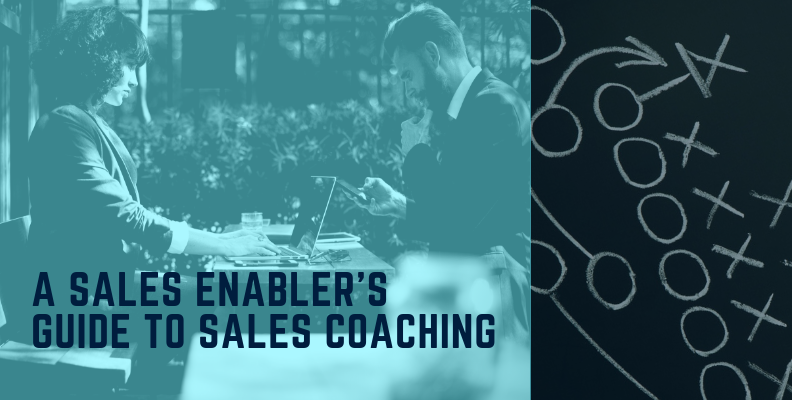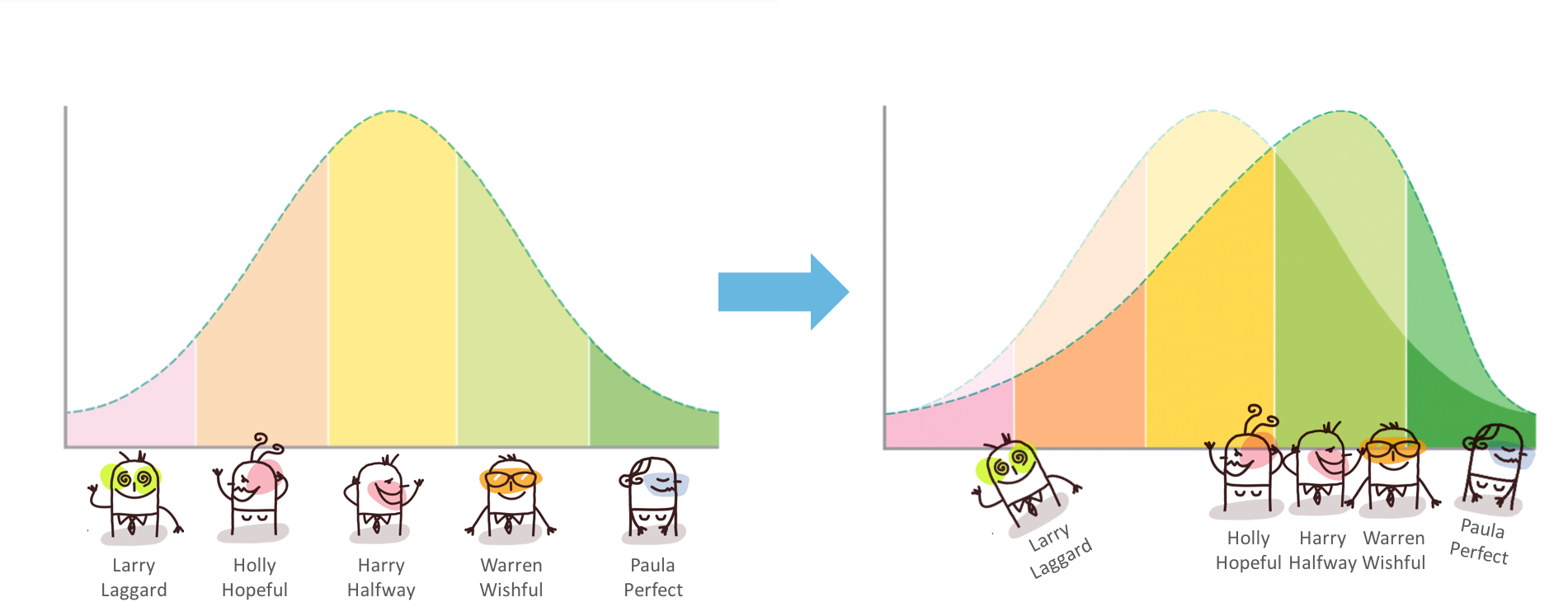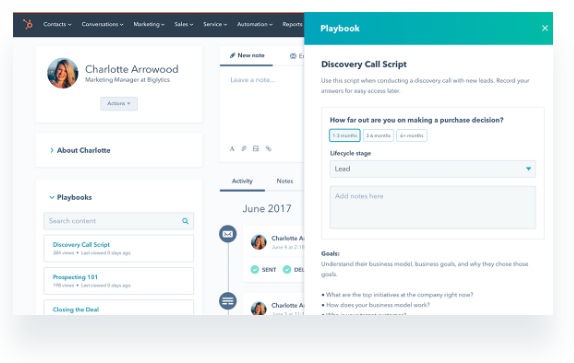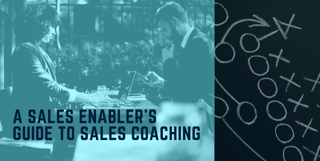
"Ok folks, it's time for some role play." And a collective groan is heard through the crowd. We all love this exercise, don't we? Ahh.. the joy of sales coaching.
The question to coach or not to coach is not even valid. One thing we do know... not coaching is not an option. As a Sales Enablement Strategist, I've heard so many sales leaders admit it's vital to the success of a sales organization, yet many of those same managers, directors, and VPs will also offer a myriad of excuses as to why coaching is not happening. Stop me if you've heard any of these:
I don’t understand the benefits of sales coaching.
I don’t have enough time.
I'm concerned about hurting a sales rep’s confidence.
I'm not sure how to coach.
Sure, some of these may be valid reasons. But with modern sales coaching techniques focusing more on data analysis to identify performance metrics like frequency and timing of activities exhibited by the most successful sales reps, we gain insight into what results are in positive sales outcomes. We can then use this path to success to guide every sales rep, motivating the right behaviors at the right time to increase deal velocity and close rates.
1) Share your vision.
Rather than just performing mundane tasks that don't connect to the big picture, sales reps can be inspired by a shared vision. By defining your vision of the future, you clarify this vision so the team may better understand the "Why".
Here are two basic methods leaders can use to better explain this vision to others:
- Define this vision of the future: Much like creating SMART (Specific, Measurable, Attainable, Relevant and Time-based) goals, coming up with a mission for your team needs to be specific, actionable, and exciting. It must go deeper than "Sell X amount of business." Try something like "Break the company record for X." To really drive this home, try to share the overall progress toward this goal during team meetings and/or in one-on-ones.
- Bring the team along by working together toward a shared vision: Understanding the team's aspirations for the future and how buying into this vision can help them achieve these aspirations.
2) Learn each salesperson’s drivers.
It's not rocket-science...what motivates one person may not move the needle for another. We all have different things to drive us to succeed. Sure, we're all in sales to make money, but one sales rep may be strapped with student loans, while another is trying to save up for a house. Find out what each rep's underlying driver is. It goes a long way to building a sense of trust, while also helping you be a better coach to that individual sales rep.
Find out what he/she wants to accomplish not just in their professional life but in their personal lives as well. According to Hubspot's Sales Director, Dan Tyre, he simply asks some of the following questions:
- Are you motivated right now?
- What do you do to motivate yourself?
- How will I know if you are not motivated?
- What do you want me to do if you don't appear motivated?
3) Focus on the middle.
Common sense may lead you to believe that coaching the weakest (or even the strongest performers) would lead to the biggest win since they may have nowhere to go but up. But research has shown that this is not always the case - particularly for the bottom 10%. These sales reps aren't just underperformers, rather are likely just a bad fit for the role. In these instances, coaching isn't really going to correct the problem. As for those top performers... these reps aren't likely to benefit from coaching either since they're most likely already executing very productive habits, to begin with.

https://www.cloudapps.com/sales-coaching-techniques/
This leaves the middle majority to focus your coaching efforts on. It's been shown that these reps can improve from quality coaching to perform up to 19%*. Heck, if you just provided average coaching methods, it's likely a below-average performing rep can improve to above-average -- a rate of 6% to 8% increase in performance. Spread this among just half of your sales force and this could mean the difference between hitting or missing your goals. This data would clearly suggest that who your managers are coaching is just as important, if not more important as how they coach.
*In our research, we defined “performance” as a rep’s gap to goal (i.e., the percentage of quota attained).
4) Shadowing Current Salesman
There is no substitute for experience. The consensus is the sooner a new hire is subjected to real-time, real-world experiences, the sooner he/she can hit the ground running. Invite them to meetings as soon as possible. Bring them along to meet bigger customers, exposing them to a confident sales rep and how they will also be able to handle such a large account can go a long way to bringing a sales rep's confidence up.
5) Incorporate Self-Training Tasks
Of course there's a difference between training and coaching, however, by investing heavily in training on the front side of bringing on a new sales rep, it will go a long way to indoctrinating her into the team and prepare her for being even more coach-able later on. One method we've seen often is preparing self-training tasks during this process to establish a foundation in how the company operates. By using this process it allows sales teams to incorporate best practices like scripting but still allows each new hire to develop their own pitches based on knowledge they've acquired through testing of the self-training.
6) Offer Digital Tools And Videos
A large part of a sales enablement strategy is the assets available to each rep as they work with prospects, leads, and customers. Another large portion of these assets ties directly to keeping the sales reps informed of new tools, best practices and simple how-to's. One of the greatest tools for this today is the advancement in video and digital access to these videos. Incorporating a video library, available 24/7 saves valuable time for reps who may have a range of questions in various levels of knowledge and skill set. Rather than asking what a sales rep may perceive to be a "dumb" question, he or she may be able to find that answer quickly and feel even better about solving it on their own. This is not to say you shouldn't make it clear that they should never feel like any question is unwelcome - it's just human nature to feel embarrassed.
Part of your role as a coach includes seeing that the outbound messaging from the sales team is delivered consistently. This must be balanced with still allowing autonomy for the sales rep to deliver this message, whether it's through email, phone, or a chatbot in a way to reflects the company's shared vision. A digital tool to aid in this is not a new idea - Playbooks - but the use of these Playbooks and how they are delivered are becoming increasingly vital to a sales coach's arsenal.

Hubspot's Enterprise Sales Software is one such tool. Leveraging Enterprise's Playbooks, for instance, equips your team with sales content such as pricing guidelines and product sheets. Additionally, managers can arm team members instant access to coaching insight right in the Hubspot CRM - limiting the number of email requests to sales leaders for access to this information.
Takeaways
Sure, sales coaching is complex. Dealing with so many different personalities at some many different levels of skill how can you expect it not to be complex? But that's what makes sales and sales coaching fun. Expect to be surprised.
The truth is, the more you care about the success of your sales reps, the more invested you become to coaching them and improving the team's overall performance. Continue to apply your own knowledge, skills, and goals as you apply your coaching skills.

